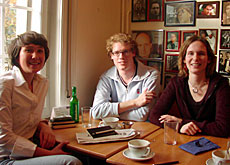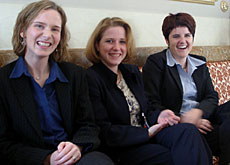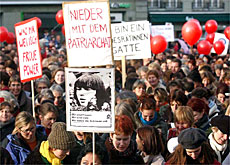Times change for parliamentary aides

The heavy workload of Swiss members of parliament has prompted some to hire part-time workers to help them out.
But others prefer to rely on their – mostly unpaid – wives to do the bulk of their administrative work.
“I couldn’t do all this work by myself,” said Social Democrat Evi Allemann, who, at 26 years old, is the youngest parliamentarian in the House of Representatives.
An increase in the allowance she receives from parliament allowed her to hire two part-time aides of her choice.
“I didn’t want an old political hand, but rather people who share my values,” Allemann told swissinfo.
As a result, she has two young assistants who are passionate about politics. Renato Wolf is a 24-year-old university student and 21-year-old Miriam Minder is following an adult education course to gain her high school diploma.
Their tasks are mainly administrative: document production, press reviews, helping Allemann with dossiers and correspondence – but carried out using the most modern of methods.
“Our office is a virtual one, we communicate by email, and if we need to inform each other about something quickly then we do it by SMS,” explains Minder. Face-to-face meetings are carried out in bars or cafés.
Classic case
A complete contrast is to be found in the case of the canton Ticino parliamentarian, Chiara Simoneschi-Cortesi, who has one personal assistant – with her own office.
Fernanda Lafranchi is middle-aged and has plenty of experience gained in the cantonal secretariat of the centre-right Christian Democratic Party. Her tasks are comparable to those of a managing director’s secretary and her office is in Simoneschi-Cortesi’s apartment.
One of the old school, she refers to her boss as “madam”.
“There are millions of things to do, the post, telephone calls, maintaining the diary – madam has a lot of commitments and I try to coordinate it all,” said Lafranchi, adding that she spends a lot of time at work, mainly out of love for the job rather than for the money.
Identification
Allemann’s two aides say they also feel very involved with their jobs:
“By being around [Allemann], we can participate in politics,” said Wolf.
“We are working on a specific political project, we’re not just limiting ourselves to getting Evi into parliament,” explained Minder.
But although both of them share Allemann’s ideals, the two aides remain very much in the background.
Lafranchi also shares her employer’s convictions, but is keen not to attach too much importance to that.
“I make things work but I leave the politics side to Mrs Simoneschi-Cortesi,” she said.
Left and right
But the use of aides has not been universally adopted and is even under attack from some quarters – particularly the Right.
“The concept of the workman-like parliamentarian, who has a strong presence in the working world, is a central one for us,” said Yves Bischel, spokesman for the rightwing Swiss People’s Party, adding that there was no need to increase the bureaucratic machinery.
Few parliamentarians from the People’s Party have assistants, with many preferring unpaid help instead.
“The Left are more keen on making a profession out of political work. We have different priorities, often it’s the wives who open the post and the dossiers remain in the hands of the parliamentarians themselves,” Bischel told swissinfo.
“A worthy vision of politics, but rather outdated,” retorted Social Democrat spokesman Jean-Philippe Jeannerat.
Jeannerat says the whole issue is based on professional seriousness, a recognition of political work and the changing reality of today’s society.
“The Swiss People’s Party might find it okay for the wife of a parliamentarian to open the post for free, but we think that it’s better for women to be in parliament itself, rather than relegated to the home, and that an aide’s work should be properly paid,” he said.
swissinfo, Daniele Papacella (translation: Isobel Leybold)
The Swiss have several times thrown out proposals to put political work on a more professional footing, the last time being in 1994.
In 2003, parliament decided to raise salaries to pay for extra personnel. But no official figures exist to show how this extra SFr30,000 is used by parliamentarians.
Swiss members of parliament earn around SFr95,000 per annum, including the new contribution.
In Italy, parliamentarians earn €14,000 a month, equivalent to around SFr260,000 a year.
German parliamentarians earn €7,000 a month, including €3,500 for additional personnel.

In compliance with the JTI standards
More: SWI swissinfo.ch certified by the Journalism Trust Initiative



You can find an overview of ongoing debates with our journalists here. Please join us!
If you want to start a conversation about a topic raised in this article or want to report factual errors, email us at english@swissinfo.ch.